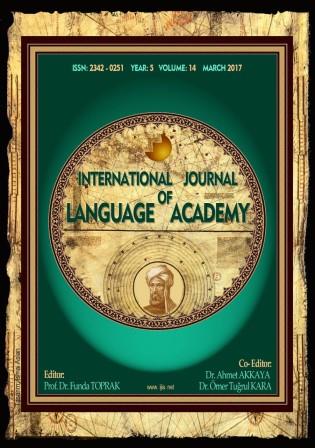KORPUSLINGUISTISCHE ANALYSE DER FEHLERTYPEN BEI DER VERWENDUNG VON "PRÄPOSITION+ARTIKEL+NOMEN" BEI DaF-LERNENDEN
Author :
Abstract
Bu çalışma, bir derlemeye ait verilerin hata analizi kapsamındaki dilbilimsel incelemesi ile ilgilenmektedir. Bu bağlamda öncelikle öğrenci derlemeleri ile dil edinimi araştırmaları arasındaki ilişki ortaya konarak öğrenci derlemesi Falko tanıtılır; sonrasında FalkoEssay L2v2.4 başlığında yer alan öğrenci metinleri, hata analizine dayanarak incelenir. Bu araştırmanın amacı, almancayı yabancı dil olarak ileri düzeyde öğrenen öğrencilerin, edat ve tanım edatı kullanımının erek dile ne kadar uygun olduğunu ortaya koymaktır. Bu kapsamda Falko derlemesindeki anotasyon, araştırma metodu olarak kullanılmıştır. Araştırmanın sonucunda tanım edatı kullanımındaki hata oranının, edat kullanımındaki hata oranına kıyasla daha yüksek olduğu tespit edilmiştir. Ayrıca hatalara ait örnek metinlerin anotasyonu, örnekçelerin (tokens) çoğunlukla ZH1Diff-Tag CHA başlığı altında (yanlış edat veya yanlış tanım edatı kapsamında) görüldüğünü ortaya koymaktadır. Sıklık analizi sayesinde tüm hata biçimleri ve bunların ne sıklıkta görüldüğü sınıflandırılmıştır. Bu sınıflandırmada amaç hipotezleri önemli bir rol oynadığı için, amaç hipotezleri veya benzer kavramların, dilsel yapıların varolan dilbilgisi kuralları ile tanımlanamadığı durumlarda oldukça gerekli olduğunu söyleyebiliriz. Dilbilgisel açıdan yaklaşacak olursak, edat ve tanım edatı konularının ileri düzeyde yabancı dil kullanımında dahi sorun teşkil ettiği sonucuna varabiliriz.
Keywords
Abstract
The present paper deals with the linguistic investigation of the data contained in a corpus received data with regard to error analysis. Firstly the relation between learner corpora and language acquisition research is represented; afterwards the learner corpus Falko is introduced; in the last point the learning texts of Falko Essay L2v2.4 are examined with regard to error analysis. The aim of this paper is to show how goal-oriented is the use of prepositions with the right articles for advanced learners of the German as a foreign language. In this context the error annotation in the learner corpus Falko is used as an examination method. Finally, it can be seen that errors in article use have higher error rates than errors when using prepositions. In addition, the annotation of example texts shows that tokens are often assigned the ZH1Diff-Tag CHA (in context: false preposition or incorrect articles). With frequency analysis all types of errors and their frequency distribution were classified. Because the target hypotheses play an important role in this classification, we can say that target hypotheses or similar concepts are always required if linguistic structures cannot be described with given grammar. From the perspective of the grammatical level, we can conclude that the prepositions and articles are still an acquisition problem in the advanced field.
Keywords
- Corder, S. P. (1986): The role of interpretation in the study. In: Corder, Stephen P. (Hrsg.): Error analysis and interlanguage. 4. impr. Oxford: Oxford University Press, S. 35– 44.
- Entrup, B. (2014): Einführung in die Arbeit mit Korpora. Beschaffung von Daten und Umgang mit Korpora. Justus-Liebig-Universität Gießen.
- Granger, S. (2002): A Bird's-eye View of Computer Learner Corpus Research. In: Granger S., Computer Learner Corpora, Second Language Acquisition and Foreign Language Teaching (Language Learning and Language Teaching; 6). Amsterdam & Philadelphia; John Benjamins, S. 3-33.
- Granger, S. (2008): Learner corpora. In: Lüdeling, Anke; Kytö, Merja (Hg.): CorpusLinguistics. An International Handbook; 1. Berlin; de Gruyter, S. 259-275.
- Lemnitzer, L./ Zinsmeister, H. (2010.): Korpuslinguistik – Eine Einführung. Narr Studienbücher. 2. aktualisierte Auflage. Tübingen: Gunter Narr Verlag.
- Ludeling, A./ Walter, M. (2009): Korpuslinguistik.In: Christian Fandrych, Britta Hufeisen, Hans-J. Krumm & Claudia Riemer (Hrsg.): Deutsch als Fremd- und Zweitsprache. Ein internationales Handbuch. 2. überarbeitete Auflage. Mouton de Gruyter, Berlin, New York.
- McEnery, T./ Xiao, R./ Yukio, T. (2006): Corpus-based language studies. An advanced resource book, London: Routledge.
- Mukherjee, J. (2002): Korpuslinguistik und Englischunterricht: Eine Einführung. (Sprache im Kontext 14, ed. Ruth Wodak and Martin Stegu) Frankfurt am Main: Peter Lang.
- Reznicek, M. et al. (2012): Das Falko-Handbuch. Korpusaufbau und Annotationen Version 2.01. Tech. Rep. Humboldt-Universität zu Berlin.
- Rösler, D. (2004): E-Learning Fremdsprachen. Eine kritische Einführung. Tübingen: Stauffenburg (=Stauffenburg-Einführungen 18).
- Scherer, C. (2006): Korpuslinguistik. Heidelberg: Winter (=Kurze Einführung in die germanistische Linguistik 2).
- Schmidt, K. (2011): Lernerkorpora: Ressourcen für die Deutsch-als-Fremdsprache- Forschung. In: Türkischer Internationaler Germanistik Kongress, 20.-22. Mai 2009. Tagungsbeiträge. Izmir, S. 555-573.
- ANNIS Interface: https://korpling.german.hu-berlin.de/falko-suche/ [24.03.2015]
